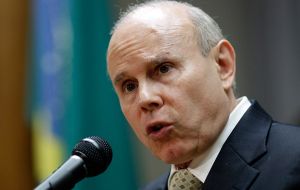MercoPress. South Atlantic News Agency
Brazil cuts 2012 spending to meet budget surplus and allow interest rates to fall
 “It is a big cut that allows us to meet the fiscal target with ease” said Mantega
“It is a big cut that allows us to meet the fiscal target with ease” said Mantega Brazil will cut 55 billion Reais (32 billion dollars) from this year’s budget to allow interest rates to fall, while increasing investment to boost growth in the world’s second-biggest emerging market.
The Planning Ministry, in a statement, said that the spending cuts from the 2012 budget approved by Congress would be spread across several ministries including a 3.3 billion Reais reduction on defense and a 5.5 billion Reais decrease on health care. Anti-poverty programs and public investment projects, including construction of low-income housing, will not be affected, the ministry said.
The size of the cut will allow interest rates to fall and enable President Dilma Rousseff to meet the targeted budget surplus before interest payments this year of 139.8 billion Reais without sacrificing public investment, Finance Minister Guido Mantega said.
“With lower rates, the country will grow more,” Mantega said at a press conference to announce the spending reductions. “It is a big cut that allows us to meet the fiscal target with ease.”
The revised budget assumes economic growth of 4.5% and inflation of 4.7% this year, Mantega said.
The government aims to fuel growth by boosting spending on infrastructure ahead of the 2014 World Cup, coupled with tax breaks and lower interest rates. Investments this year will rise 11% over 2011, Mantega said.
The central bank said last month there is a “high probability” the overnight rate will fall below 10% this year. The bank’s interest rate outlook assumes the government will meet its primary surplus target. Since August, policy makers have reduced the Selic rate by 200 basis points to 10.50%.
Brazilian consumer prices rose by 0.56% in January, the fastest pace in nine months, while annual inflation slowed to 6.22%.
Last year, the government met its primary surplus target, equal to about 3.1% of GDP, after Rousseff froze federal hiring and cut 50 billion Reais from her initial budget proposal.
The government has said infrastructure investment of 140 billion Reais will be needed to host the World Cup and the 2016 Olympics. The Finance Ministry estimates that GDP grew 3% last year despite a contraction in the third quarter that was the first in more than two years.
Rousseff’s spending plans, coupled with additional rate cuts, will push inflation over the 4.5% this year according to a central bank survey of economists. Consumer prices will rise 5.29% this year and 5% in 2013, according to the median estimate of about 100 analysts in a Feb. 10 bank survey.




Top Comments
Disclaimer & comment rules-

Read all commentsWith lower rates the country will grow more (perhaps) AND the retired people with a bit of money in the bank will pay for it (true).
Feb 17th, 2012 - 10:45 am 0Commenting for this story is now closed.
If you have a Facebook account, become a fan and comment on our Facebook Page!